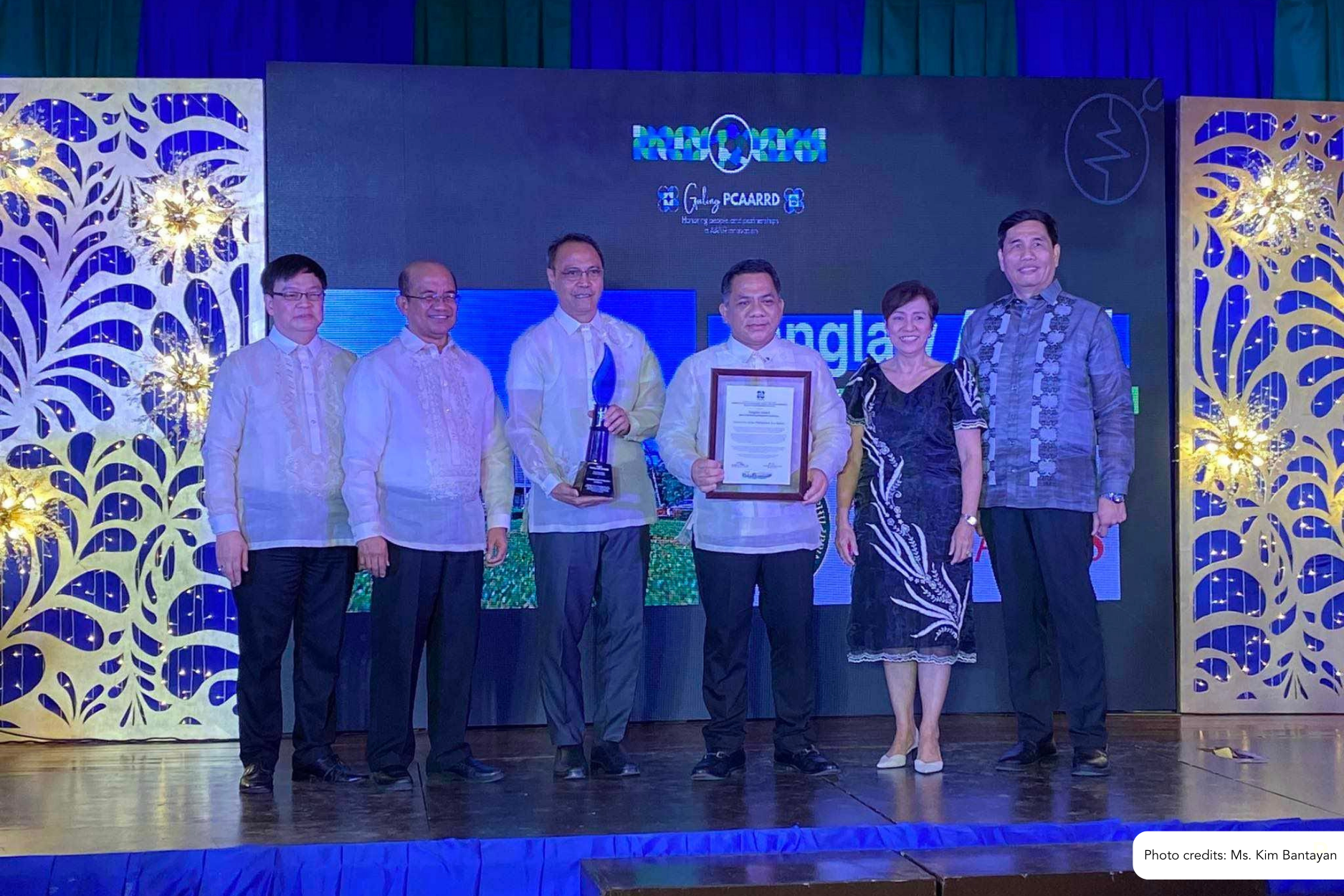
On November 10, 2023, the University of the Philippines Los Baños (UPLB) and its researchers were recognized for their outstanding achievements at the Pantas and Tanglaw Awards 2023, hosted by the Department of Science and Technology-Philippine Council for Agriculture, Aquatic, and Natural Resources Research and Development (DOST-PCAARRD).
Lighting the way in AANR research
UPLB was celebrated for its research excellence, receiving the distinguished Tanglaw Award for Outstanding Research Institution. PCAARRD executives, headed by Dr. Reynaldo V. Ebora, presented the award to UPLB Chancellor Jose V. Camacho, Jr., who was accompanied by UPLB Vice Chancellor for Research and Extension Nathaniel C. Bantayan.
Named after the Filipino term ‘tanglaw’ – light to guide one’s path – this award is given to local agencies or institutions for their exemplary performance in advancing the agriculture, aquatic, and natural resources (AANR) sector. Among others, the award takes into consideration the institutions’ major accomplishments in research and development projects, publications, linkages formed, and intellectual property rights.
According to PCAARRD, UPLB pioneered AANR research and development initiatives, targeting vital areas such as sustainable agriculture, food security and nutrition, environmental conservation, and community development.
Over the last five years, the university achieved a research budget of over PHP4.2 billion, implemented 2,833 R&D projects, and produced over 500 technologies and significant information through needs-based research over the last five years. These included the development of smart agricultural technologies such as disease-resilient plant varieties and technologies for pest detection and management, which significantly helped farmers increase crop yields, lessen losses, and improve farmers’ livelihoods.
Chancellor Camacho, in his acceptance speech, emphasized that the award attest to the unwavering commitment and dedication of the entire UPLB scientific community, including faculty, researchers, extension staff, and students.
“This award is a reminder for us to continue pushing forward for the sake of our vision and in the name of public service. Now more than ever, our country and the world is in need of solutions to our pressing global issues. Whether in the form of evidence-based policy recommendations, technological innovations or community interventions, UPLB will continue to step up to the challenge of providing relevant and responsive solutions for the needs of our stakeholders.”
Chancellor Camacho also pledged on behalf of UPLB to sustain collaboration and innovation with both private and public sector entities, aiming for sustainability, resilience, and future-proofing.
Along with a trophy, the university was awarded a PHP5 million grant for station development, capability building, and upgrading of facilities.
Pushing fungal frontiers
Dr. Nelly S. Aggangan was also granted the Pantas Award for Most Outstanding Researcher/Scientist. Deriving its name from ‘pantas’—the Filipino word for a specialist or scholar—the award is given to those whose discoveries and innovations have advanced technologies, knowledge, and information in the AANR sector. The award’s criteria include the nominee’s R&D findings of national significance, their published work in the last five years, and their active participation in science and technology organizations.
Dr. Aggangan started her research career—now over 40 years—at UPLB’s National Institute of Molecular Biology and Biotechnology (BIOTECH) in 1980. While she is now retired, she is still involved in UPLB projects as a consultant. Her work on mycorrhizal fungi has focused on the development and commercialization of microbial-based biofertilizers, such as MYKOVAM and MYKORICH. This biofertilizer has been proven to significantly reduce the need for costly chemical fertilizers while improving plant growth, crop yield, and soil fertility for both agricultural and reforestation purposes.
“In my four decades, there were many obstacles encountered in developing Mycorrhiza technologies,” Dr. Anggangan said in her acceptance speech. “What made me get through them with flying colors is a trait that is similar to Mycorrhiza that is placed in mined-out, acidic, low, nutrient soil—resilience. Resilience is important to push through in your research, just like plants inoculated with Mycorrhiza, of course, my favorite. They became tolerant to drought, high temperature, and heavy metals, [and so] we must endure the struggles, the setbacks, and the trials.
“Just like how Mycorrhiza enhances plants’ absorption of nutrients and water, it is important to be more open to innovation, ideas, innovative ideas in order to grow. My research work, like Mycorrhiza and plant roots, have spread and thrived and provided significant benefits to its hosts, which in turn, benefited its environment and community.”
Additionally, Dr. Anggangan’s development of the Marinduque bioremediation protocol (MBP) was integral in revitalizing a decades-long abandoned mining site. Through the use of microbial biofertilizers and soil amendments, native tree species were able to thrive in soil polluted by heavy metals—a feat compared to the 5-10% survival rate of trees previously planted in the area. As Dr. Angganan noted- the Greening mined-out areas in the Philippines (GMAP) program was already in its eighth year.
Dr. Juanito T. Batalon, OIC of the Office of the Executive Director for Research and Development (OED-RD) gave the awarding ceremony’s closing remarks. He thanked those present for being with PCAARRD in its 51-year journey, saying their vision of a sustainable future would not be possible without them. The celebration, he emphasized, was not just a commemoration of PCAARRD’s journey and achievements, but of the dedication of the people who strove to make a difference in the lives of their stakeholders through their contributions of time, knowledge, resources, and expertise.
Dr. Batalon ended his speech with a call for continued partnerships. “I wish that in the future you will still work with us in building a legacy of excellence, innovation, and resilience, and continuously fostering a culture where bright solutions, creative ideas, transformative technologies will be embraced wholeheartedly to brave the challenges ahead.” (Jill Parreño)
